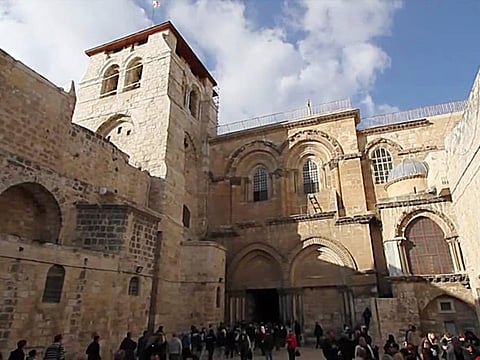Why is Israel threatening Christian churches in Jerusalem?
It is incomprehensible why some sponsor countries are turning a blind eye when Jerusalem, a unifying symbol for all Christians, is at risk of losing a major component of its shared religious value

Two controversial and almost certainly illegal measures targeting churches in occupied East Jerusalem have been suspended by the Israeli government following a historic three-day closure last month of Christianity’s holiest site; the Church of the Holy Sepulchre. In a rare show of unity the heads of the three churches running the site; Catholic, Greek Orthodox and Armenian, agreed to shutter the centuries-old gates of the church in the heart of the Old City in protest of the two Israeli moves.
The first was a decision by Israel’s mayor of occupied Jerusalem to end the municipal tax exemption for church-owned properties in [occupied] Jerusalem and to freeze church bank accounts, and the second was a proposed Knesset bill allowing the expropriation of lands sold by churches to private buyers.
Under pressure from local Christians and fearful of an international backlash, Prime Minister Benjamin Netanyahu decided to suspend implementation of the measures — for now. The timing of the closure was sensitive as thousands of Christian pilgrims from all around the world head to occupied Jerusalem and the Holy Land to mark the beginning of the great fast, or Lent.
Israeli measures would break a centuries-old tradition, since Ottoman times, which exempted churches in Palestine from paying taxes. Successive British, Jordanian and Israeli authorities had respected that tradition. The churches see these measures as another move to contain Christian existence in occupied Jerusalem and expropriate church lands.
The only country that reacted immediately to the Israeli measures was Jordan. It condemned the Israeli moves and supported the closure of the Church of the Holy Sepulchre. Government spokesman Mohammad Al Momani described the measures as illegal and rejected systematic moves to change the historical and legal status quo in occupied East Jerusalem’s holy sites, including Islamic and Christian property and endowments.
Jordan and Israel had concluded an agreement in January to end a diplomatic crisis over the killing of two Jordanians in Amman by an Israeli diplomat last July. Also in July, Jordan and Israel had a diplomatic face-off over Israel’s decision to install metal detectors at the entrance of the Aqsa Mosque. Israel later backed down and lifted entry restrictions to the compound.
Under the Jordan-Israel peace treaty of 2004 and an agreement with the Palestinian Authority in 2013, King Abdullah has custodianship over Muslim and Christian holy sites in occupied East Jerusalem. Successive incursions by Israeli extremists, including lawmakers, of Al Aqsa compound, continue until today, adding to growing tensions between Jordan and the Israeli government.
The latest confrontation with Jerusalem churches is seen as another episode in a Far Right Israeli scheme to limit non Jewish presence in the Old City, expropriate church lands and empty occupied East Jerusalem of its indigenous Palestinian population. The city’s Christian population, around 13,000, has suffered over the years. Recent studies suggest they now make up 2 per cent only, down from 20 per cent in 1946, of the population of occupied East Jerusalem.
The city’s overall Arab population is now hovering around 340,000 but that includes Arab suburbs of the city. Since US President Donald Trump’s recognition of occupied Jerusalem as Israel’s capital last December, Israel has accelerated plans to build additional housing units for Jews in occupied East Jerusalem and to change the boundaries of the city as a whole. The goal is to decrease the number of Palestinians in occupied East Jerusalem, through economic, political and demographic punitive measures. The city’s Christians are an easy target.
The Israeli measures contradict Netanyahu’s recent statements that under Israeli rule, Jerusalem is open for worship to followers of the three faiths. Despite the small number of their congregation, the three dominant churches in occupied Jerusalem own large plots of land in East Jerusalem. The Greek Orthodox Church is reportedly the second-largest landowner, after the Israeli government, with deeds to about 30 per cent of occupied Jerusalem’s Old City in addition to lands outside occupied Jerusalem, Israel and the West Bank.
In fact the Israeli government does not own lands on which the Knesset and the Prime Ministry stand. In recent years Jordanian and Palestinian authorities expressed concern over the questionable sale of church-owned lands to anonymous buyers.
The battle for occupied East Jerusalem is undoubtedly the most crucial since Trump’s declaration and the peace plan that he is expected to announce. Israel’s suspension of its measures against the churches represents a short-lived lull in that battle. Without access to commercial property owned by these churches the Israeli scheme to Judaise the Old City and most of occupied East Jerusalem will be in peril. There is no doubt that Israeli Far Right politicians will make a fresh push to re-impose these measures once more soon.
It is unfortunate that only Jordan, with its limited area of manoeuvre, is standing against such Israeli actions and with occupied Jerusalem’s Christians. The responsibility for defending Christian rights also falls on other church sponsor countries including Greece, Armenia and the Vatican. With the Christian population under pressure, Jerusalem, a unifying symbol for all Christians, will lose a major component of its shared religious value. It is incomprehensible that some American evangelical churches are turning a blind eye to this catastrophe.
Osama Al Sharif is a journalist and political commentator based in Amman.



